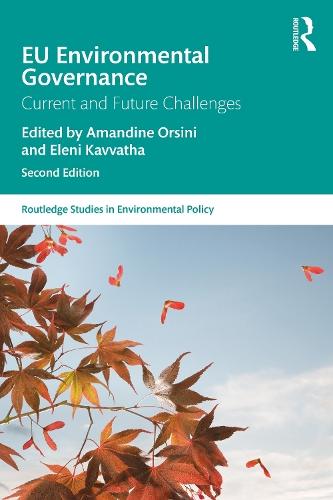Full Product Details
Author: Amandine Orsini (Université Saint-Louis - Bruxelles, Belgium) ,
Eleni Kavvatha
Publisher: Taylor & Francis Ltd
Imprint: Routledge
Edition: 2nd edition
Weight: 0.600kg
ISBN: 9781032766119
ISBN 10: 1032766115
Pages: 290
Publication Date: 05 September 2025
Audience:
College/higher education
,
Tertiary & Higher Education
Format: Paperback
Publisher's Status: Active
Availability: Not yet available

This item is yet to be released. You can pre-order this item and we will dispatch it to you upon its release.
Reviews
""This second edition of EU Environmental Governance keeps the best insights of the first edition while insisting on crucial questions about the growing challenges faced by the European Union: can the EU remain a “laboratory” for environmental politics and deal with the environment as a “human right” whereas the Green Deal seems weakened? Can it reconcile its trade and environmental policies? Is the EU Arctic policy effective? How to integrate youth in environmental policy? A must-read collective book for all students and scholars interested in environmental governance and EU studies"". – Franck Petiteville, Professor of Political Science, University of Grenoble Alps, France “The second edition of this interdisciplinary book offers a timely and insightful reconsideration of the EU governance system and its capacity to tackle the major environmental challenges arising from the “triple planetary crisis” at both regional and global levels. The expert input provided in this book by both academics and practitioners will meaningfully contribute to developing much-needed informed policies and to specialized teaching and research activities. It represents an indispensable source of knowledge for anybody interested in environmental matters (researchers, students, NGOs, law and policy-makers, professionals, etc.) and a valuable addition to university libraries all over the world.” – Stefania Negri, Associate Professor of International Law, University of Salerno, Italy
""This second edition of EU Environmental Governance keeps the best insights of the first edition while insisting on crucial questions about the growing challenges faced by the European Union: can the EU remain a 'laboratory' for environmental politics and deal with the environment as a 'human right' whereas the Green Deal seems weakened? Can it reconcile its trade and environmental policies? Is the EU Arctic policy effective? How to integrate youth in environmental policy? A must-read collective book for all students and scholars interested in environmental governance and EU studies"". – Franck Petiteville, Professor of Political Science, University of Grenoble Alps, France “The second edition of this interdisciplinary book offers a timely and insightful reconsideration of the EU governance system and its capacity to tackle the major environmental challenges arising from the 'triple planetary crisis' at both regional and global levels. The expert input provided in this book by both academics and practitioners will meaningfully contribute to developing much-needed informed policies and to specialized teaching and research activities. It represents an indispensable source of knowledge for anybody interested in environmental matters (researchers, students, NGOs, law and policy-makers, professionals, etc.) and a valuable addition to university libraries all over the world.” – Stefania Negri, Associate Professor of International Law, University of Salerno, Italy
Author Information
Amandine Orsini is Professor of International Relations at the UCLouvain Saint‑Louis – Bruxelles (USL‑B). She is Jean Monnet Chair on “the European Union and Global Green Politics: the Anthropocene Challenge” (EUGlobal‑Green) and is the academic Director of the advanced Master on EU environmental governance (POLLEN Master) at USL‑B. She has published Essential Concepts of Global Environmental Governance (2020) and Global Environmental Politics. Understanding the Governance of the Earth (2020). Eleni Kavvatha is a researcher in Arctic and EU Relations at UCLouvain Saint‑Louis – Bruxelles, where she works for CReSPo (Centre of Research in Political Science) and the ISPOLE (Institut de Sciences Politique) under the supervision of Amandine Orsini. Her research is focused on the impact of EU environmental policies on the Sámi Indigenous People in the European Arctic region. She has worked in Belgium, Norway, Iceland, Svalbard, Greenland and the Finish Lapland, on subjects related to EU External Relations in the High North, non‑state actors in the Arctic, Indigenous Peoples Organizations, Arctic communities and Arctic Governance. She holds a Master’s degree in Environmental Governance and Sustainable Development from Panteion University of Political and Social Studies in Athens, followed by a Master’s degree in Governance and Entrepreneurship in Northern and Indigenous Areas from UiT, The Arctic University of Norway. She has co‑edited the previous edition of this book for Routledge publishing house under the title EU Environmental Governance: Current and Future Challenges and has several publications related to the Arctic.



